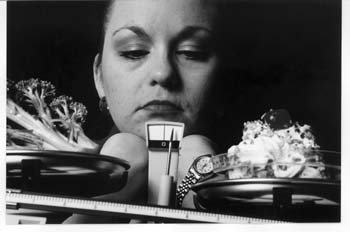Are You What You Eat?
Tipping the Scales: Saintly broccoli or sinful ice cream--does our sense of virtue focus on food because virtue has no place in the rest of our lives?
Chewing the fat over food morality
By Marina Wolf
THOUGH WE ALL DO IT several times a day--while blocking an aisle in the grocery store, perusing a menu or foraging in our own refrigerators--choosing something to eat can be a torturous process. There is so much to consider: boycotts, health warnings, the sensibilities of one's dining companions. In more lucid moments we may well wonder how such a basic substance as food--which our ancestors just found and ate with nary a twinge of conscience--has come to engender such ambivalence and moral distress.
Most of us have a sense of "good" food and "bad" food; though we don't always articulate it, we feel guilty when we transgress. We may rebel against that guilt with a naughty sense of breaking taboo, or we may repent with a vigorous asceticism befitting a medieval monk. But no matter how we slice it, the battle between right and wrong is on.
And it's on our plates.
On the face of it, our code of food morality seems very simple, breaking down into constituent parts--carbohydrates, sugar, salt, cholesterol, fats of various kinds--and supposedly essential truths about them. But nutrition science surges ever onward, constantly releasing new and contradictory studies. Butter was the bad guy up until a couple of months ago, when a new study suggested that the polyunsaturated fats in margarine may heighten the risk for developing breast cancer. Sugar is blamed for murder and premenstrual mayhem; dairy prolongs colds; flour stuffs you up; and cholesterol gets it both ways with its "good" and "bad" varieties.
God forbid you should happen across a food substance that contains more than one of these component evils. Look at what people love to feel bad about: chocolate truffles, ice cream, potato chips, French fries. Several centuries after its inception, Puritanism is still cookin': if it tastes good, it's got to be bad.
Minneapolis food critic Jeremy Iggers pins the birth of our guilty obsessions on poor old Julia Child. Before the '60s, says Iggers, Americans ate pretty much the same food. "You could find tuna casserole in a CEO's mansion," he notes. Gourmands were looked at with disdain and distrust. But Child gave permission for people to enjoy gourmet fare, suggests Iggers in The Garden of Eating (Basic Books, 1996). She handed America the forbidden fruit--food awareness--on a silver platter with some nice garnish, and we developed a taste for it.
THERE ARE CERTAINLY enough health warnings floating about to give all but the most unrepentant hedonist pause--even with the retro chic that has revived steakhouses, martinis and the 6-inch stogie. But fear of mortality isn't the only thing that drives our eating habits. Concern for appearances, too, plays a part. Much attention has been focused on women and their relationship with food, but the new wave of food morality seems to be sucking in men, too. While men traditionally have had more latitude in appearance, the net is closing--especially around those younger men targeted by Details and other magazines that sell a certain buffed body type along with snowboards and jeans.
Youthful vanity doesn't account for all of the newly emerging eating anxiety among men, though. Siota Belle, a clinical nutritionist and homeopath, believes the increased attention to eating habits to be fueled in part by the baby boomers. "The population is aging," she says. "More and more people are getting 'middle-aged spread.' " Belle never had a single male eating-disorder case out of the hundreds of clients she saw during the '80s. "Now I am beginning to get some men coming in worrying that they eat too much."
Though body fat has not been proven to be a causative indicator of heart disease, cholesterol levels or insulin tolerance, that doesn't matter in today's appearance-crazed society. You can't just have clear arteries to be considered in good health--you need to look good as well. Social critic Barbara Ehrenreich, in an essay titled "The Naked Truth about Fitness," decried "healthism"--the prevailing perception of health as a virtue. She suggests that we focus our sense of virtue on food because virtue seems to have no place in the rest of our lives. A nation of latent anorexics, we control food because everything else feels increasingly out of control.
Like many a collective obsession, food angst may just have to get worse before it gets better. But most assessments of the situation offer a grain of hope for its resolution. If it is but a sign of our crazy times, it should ebb and shift like other trends and fade away into a footnote.
If food morality should come to be even more strongly regulated by the government--taxes on high-fat foods have been mentioned more than once by prominent food authorities--a countermovement will emerge as a matter of civic duty. And if we can redirect even a fraction of the energy we spend on choosing, eating and arguing about food, we may yet discover a greater sense of involvement in the fates of our families, communities and environment.
However difficult it is to agree on collective working definitions of "right" and "wrong," it still makes more sense to work them out in public than over dinner.
[ San Jose | Metroactive Central | Archives ]
Copyright © Metro Publishing Inc. Maintained by Boulevards New Media.
![]()

Photo illustration by Michael Amsler
From the April 2-8, 1998 issue of Metro.
![[Metroactive Dining]](/dining/gifs/dining468.gif)